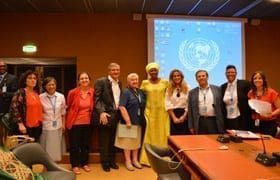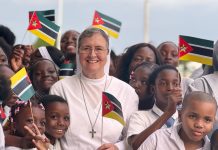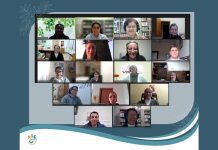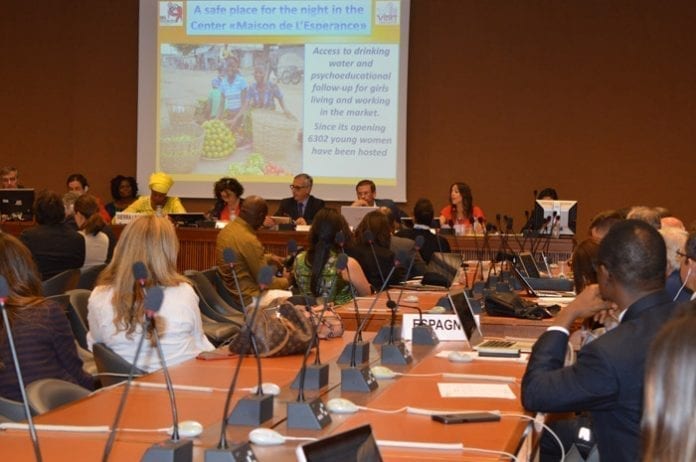
Geneva (Switzerland). IIMA and Vides participated from 18 June to 6 July 2018 at the 38th Session on Human Rights, which is taking place at the United Nations headquarters in Geneva.
The issues addressed by the Council every day include: Promotion and protection of all human, civil, political, economic, social, and cultural rights, including the right to development.
In particular at this session the issues addressed are: discrimination based on sexual orientation and gender identity; freedom of association, assembly and expression; women’s rights and the emergence of combating contemporary forms of glorification of neo-Nazism fueling the phenomena of racism, racial discrimination, and xenophobia. Besides this, the theme of growing intimidation and reprisals against those who request the collaboration of the United Nations and the protection of human rights is underlined.
The 38th session opened on Monday 18 June with greetings from Ambassador Vojislav Suc of Slovenia, President of the Human Rights Council, followed by the report on the human rights situation in the world and the activities of the Office of the High Commissioner for Human Rights.
The day of 22 June was a very important day because, IIMA, International Mary Help of Christians Institute, VIDES International, Don Bosco Fambul Center of Sierra Leone, Missiones Salesianas, Don Bosco Jugendhilfe Weltweit and the Permanent Mission of Italy organized the side event “Girls with no name – Good practice for the reintegration of girls in the street situation”. In addition to the Permanent Mission of Italy, the event was co-sponsored by the Permanent Missions of: Sierra Leone, Montenegro, Honduras, the Philippines, Paraguay, Spain, Colombia, the Delegation of the European Union, and the UN Office of the High Commissioner for Human Rights.
The side event opened with the intervention of Italy’s Permanent Representative to the United Nations, Massimo Bellelli, who introduced the sensitive issue of children in street situations, underlining Italy’s commitment to this phenomenon. It was followed by a video of the touching testimony of a girl from Sierra Leone, Augusta Ngombu – Gboli, forced to prostitute herself as a child after she was orphaned of both her parents and saved thanks to the Salesian mission Don Bosco Fambul. Now this brave young girl fights to help other girls like her who have been victims of prostitution.
The testimony was followed by the intervention of Fr. Jorge Crisafulli, director of Don Bosco Fambul in Sierra Leone, who recounted the experience of the Don Bosco Center with girls on the streets and forced into prostitution, due to a situation of extreme poverty. There are more than 1500 girls in this condition in Free Town. Thanks to the intervention of the Salesians since 2016, 163 young people have left the street and have been reintegrated into their families.
In the Side event promoted by IIMA and VIDES International, the presence of the First Lady of Sierra Leone, Fatima Maada Bio, was highlighted, who in her speech, stressed her personal commitment to collaborate with civil society to improve the situation of young girl prostitutes and the government’s commitment to making education accessible to all by asking for support from the international community.
Subsequently, Elisabetta Murgia, representative of VIDES and IIMA, presented the good practices implemented by the Salesian Sisters in Benin and India. In particular, she illustrated the work carried out for the rehabilitation of the Vidomegon (girls sold by the poorest families in the hope for a better life, who today unfortunately become victims of trafficking and exploitation). Practices and methodologies for the prevention and reintegration of these girls in society were illustrated. Since 2001, more than 4,000 girls who worked in the capital market, have been included in vocational training or formal school and have been re-united with their families or communities of origin. Furthermore, the activities have been reported of the Salesian Sisters and of VIDES in India, in Tamil Nadu, in favor of the girl victims of child marriages.
This was followed by Hatem Kotrane, an expert from the UN Committee on the Rights of the Child. The expert reiterated the urgency of working for such a target and underlined some obstacles in this delicate work: lack of objective statistical data that photographs the phenomenon, the presence of often weak and insufficient legislative measures to combat child exploitation, the need for greater prevention. He then concluded with an overview of the situation in the three countries of Sierra Leone, Benin, and India, thanks to data collected by the Committee on the Rights of the Child.
Federica Donati, coordinator of the OHCHR Equality, Non-Discrimination and Participation Unit, underlined how in analyzing the phenomenon of children in street situations, it is necessary to consider that girl children and young girls suffer from greater discrimination and stigmatization. Hence the urgency of ad hoc measures for this target.
At the end there was the message of Massimo Bellelli, who encouraged us to continue working to help the girls who are victims of abuse. Fifteen Permanent Missions present, including Spain, Montenegro, Iraq, Poland, and also the experts of the High Commissariat present, appreciated the work carried out by Salesian missions and underlined the importance of continuing with this commitment. The need to adopt an approach on human rights and on prevention and networking has been reiterated.
The side event was moderated by Imma Guerras – Delgado, team leader for the Rights of Children and Youth at the High Commission for Human Rights.




















